- Home
- Catherine Jinks
Pagan's Vows Page 5
Pagan's Vows Read online
Page 5
Past the almonry door, past a scented rose bush. Stubbing my toe on a rock, God curse it. And what’s that noise? What’s that noise, up ahead? It sounds like – it sounds like
– Someone slipping out of the kitchen.
Who in the world could it be? A dim form in long skirts, holding a flickering candle. A face, bent over the candle-flame: smooth, round, with small features and a high forehead.
A woman’s face.
‘Hoi! Woman!’
She stops. She’s terrified. Is she going to faint? Yes. No. She’s clutching something against her chest, and whimpering like a puppy.
On second thoughts, she’s not a woman. She’s just a girl.
‘Who are you?’ Stepping forward to block her path. ‘What are you doing, here? You shouldn’t be here.’
She shrinks back. ‘S-Saurimunda,’ she whispers.
‘What?’
‘Saurimunda. I am Saurimunda.’
‘What’s that you’re holding?’ (Something to eat, I’ll bet.) Her face crumples; she begins to cry.
‘I didn’t steal it,’ she groans. ‘I didn’t, I didn’t steal it–’ ‘What is it?’
‘Sugar.’ Roquefire’s voice, low and husky. He’s standing just inside the kitchen door, with a lamp in his hand. ‘It’s loaf sugar. I gave it to her.’
‘You did?’ (And how, may I ask, did you get hold of that stuff? Loaf sugar is worth a king’s ransom.) ‘Not that it’s any of my business, but where the hell did it come from?’
‘It’s mine. I didn’t steal it. It was given to me.’ Roquefire waves at the girl. ‘Go on. Get. Get out of here, quickly.’
‘But –’
‘Get!’
She turns and flees across the kitchen gardens, heading for the eastern wall. Is there a gate in it, somewhere?
‘I found a hole,’ Roquefire mumbles. ‘She’s small enough to squeeze through, now that I’ve made it a bit bigger.’ He looks at me sideways, his eyes glittering in the lamplight. ‘She comes to visit me, when she can. When I leave the red stone on the right, instead of the left.’
‘I see.’
‘She’s a friendly girl. Why shouldn’t I give her a bit of sugar? Especially since it’s mine. It is mine, you know. The almoner gave it to me.’
All right, all right, I believe you. Now let’s drop the subject, shall we? There are other things I want to talk about.
‘Truly, Roquefire, it’s none of my business. I don’t care what you do with your evenings. I came to get a lamp.’
‘A lamp?’
‘There’s something I have to read, tonight.’
He seems a little confused. But he nods, and moves aside to let me pass. ‘Come in,’ he says softly. ‘Just keep it down, will you? There are cooks sleeping upstairs.’
Oh, I’ll be quiet, you don’t have to worry about that. The kitchen smells of woodsmoke and baked fish: embers glow on the hearth, and dogs snore under the table. There’s a washing trough and a wicker fan, and a spice box with a lock on it. You could boil a Byzantine army in each of the cooking-pots. The room is filled with brooms, buckets, bellows, skimmers, saucepan boards, everything a well-stocked kitchen should have.
Including a couple of oil-lamps, tucked onto a shelf between the tongs and the salt-cellar.
‘You won’t tell anyone, will you?’ says Roquefire, as he fetches one of the lamps. ‘About my friend? Or the sugar? That sugar’s a big secret.’
‘Oh really?’ How interesting. ‘Why?’
‘Well . . . it’s payment, you see. For a service.’
He leans very close, and blows a cloud of garlic into my face. He doesn’t look very healthy from this distance: his skin is yellow, his eyes sticky and bloodshot. There’s already grey in his hair, even though he can’t be more than a few years older than I am.
‘But if I tell you about it, you’ve got to promise you won’t tell anyone else,’ he breathes.
‘That depends on what you’ve done.’ (Trying to pull away, without making it obvious.) ‘You didn’t kill anybody, did you?’
He laughs through his nose.
‘Me?’ he says. ‘Of course not.’
‘Did the almoner?’
‘The almoner?’ His smile fades; he glares suspiciously. ‘Who said anything about the almoner?’
‘You did. You said that he gave it to you. The sugar, I mean.’
‘Oh.’ You can practically hear his brain grinding away as he thinks. ‘Well,’ he murmurs, ‘it’s true. The almoner gave it to me, so that I wouldn’t tell anyone about his visit.’
‘What visit?’
He knits his brows; bites his lip; peers into my face. ‘Will you swear not to say anything about my friend?’ he whispers.
‘Only if you swear not to say anything about my lamp.’
For some reason, this seems to reassure him. He snorts, straightens up, and thumps me on the shoulder.
‘I knew you were a good fellow,’ he says. ‘I knew you weren’t like those other monks. They’ve all got water in their veins, and feather pillows where their guts should be –’
‘Yes, but what about the almoner’s visit? Where did he go? You have to tell me now, you can’t leave me in suspense.’
‘Ah. Well.’ He rolls his eyes, and sticks his tongue in his cheek. The result is a kind of ferocious leer. ‘Old Father Aeldred has a lady friend. A widow.’
‘Really?’
‘Yes. You see, every Tuesday he visits the poor, in town. To give alms. And I go with him, because someone has to protect the money. But two months ago he began to visit a house that wasn’t so poor.’ Nudge, nudge. Wink, wink. ‘A widow’s house.’
‘How do you know?’
‘Because I stand outside while he visits!’ Another leer. ‘I don’t see what he does, mind, I just wait on the doorstep. All I know is her name: Beatrice Mazeroles de Fanjeaux.’
Well I’ll be spit-roasted. Who would ever have believed it? Aeldred the almoner! Thinking back to his pale, blinking eyes; his red, fidgety hands; his thin hair and buck teeth. ‘He doesn’t look the type.’
‘Well he is. Because he told me not to tell. And he gives me things, every time we go.’ Roquefire rubs his hands together, grinning. ‘Dried apricots. Loaf sugar. Almond paste. Syrup of ginger. Strawberry tarts.’
‘And you give them to Saurimunda?’
Roquefire ducks his head, still grinning. He looks at me out of the corners of his eyes. ‘Some of them,’ he says. ‘It keeps her happy. It keeps her coming back.’
‘Mmmm.’ I’ll bet it does. Only a strawberry tart would make up for that garlic breath. ‘But who is she? A peasant? A beggar?’
‘Oh . . .’ He dismisses her with a wave of his hand. ‘She’s just a girl. A girl from the village. She’s nobody.’ A pause. ‘But if you want one yourself,’ he adds, with a suppressed snigger, ‘I can always ask – ’
‘No thanks.’ (This is getting squalid.) ‘I’m spending all my spare time with Boethius.’
‘Boethius?’ He frowns. ‘Who’s that?’
‘He wrote this book.’ Tapping its cover. ‘And I’ve got to read it. Is there anywhere here that I can read in peace? Without a circator poking around?’
Roquefire nods violently, so violently that I’m half afraid his head’s going to fall off.
‘There’s a place behind the stairs,’ he says. ‘It’s the buttery. You can close the door, and no one will bother you.’
‘In locum refugii.’
‘What?’
‘Into a place of shelter. Thanks, Roquefire. I owe you one.’
‘It’s nothing.’ He winks, and moves towards the staircase. ‘You keep your secrets, I’ll keep mine.’
Secrets, secrets. Always secrets. Now I really know I’m in a monastery again.
If you ask me, all monasteries are full of secrets.
Chapter 8
‘What is a proposition?’
‘A proposition is an expression signifying what is true or false.’
‘
What is a question?’
‘A question is a proposition brought into doubt.’
‘And a conclusion? What is that?’
‘A conclusion is a proposition confirmed by argument.’
Clement nods. Yes! Well done, Pagan! That’s showing him. That’s showing the shrivelled old corpse. Thought you’d beat me, didn’t you, Master Needle-nose? Didn’t think I’d be able to answer your questions, did you?
‘ “A conclusion is a proposition confirmed by argument”,’ he repeats, slowly. Across the room, Raymond and the others are playing a psalm-game. One of them recites the first line of a psalm, and someone else has to 58 break in with the rest of it. Not much of a game, but it seems to keep them happy.
I just hope Roland is getting along all right.
‘But what is this argument that you refer to?’ Clement suddenly remarks. ‘Pagan? Look at me. What is an argument? Can you tell me that?’
An argument? Let’s see, now. I know this. I remember reading this. Just let me think . . .
‘Surely you haven’t forgotten?’
No I haven’t forgotten! Just get off my back, will you? An argument is . . . an argument is . . .
‘An argument is a reason producing belief regarding a matter that is in doubt.’
Hah! So there. You’ll have to do better than that, old man. He opens Boethius, and begins to leaf through it. Hope he doesn’t notice the lamp-oil that I spilt on the cover last night. Hope he doesn’t notice the faint smell of baked fish.
‘Here,’ he says, and hands the book to me. ‘Read the first three lines. In translation.’
The first three lines? Oh – up to here, you mean.
‘ “Of all arguments, some are readily believable and necessary; some readily believable and not necessary; some neces sary but not readily believable, and some neither readily believable nor necessary”.’ (What? What is this garbage? Boethius must have had a hangover when he wrote this.) ‘ “Something is readily believable if it seems true to everyone, or to most people, or to the wise . . .” ’ (You don’t say.) ‘ “. . . In this, the truth or falsity of the argument makes no difference, if only it has the appearance of truth.” ’
Hold on. What’s this? The appearance of truth? Look up at Clement: his expression is unreadable.
Well I’ll be damned. I’ll be double damned.
‘Master, you said something yesterday. You said that lying lips are an abomination to the Lord.’
‘Those were not my words,’ he replies. ‘Those were the words of Solomon.’
‘But it says here that a lie is no more than a readily believable argument!’
A pause. There’s a glint in his eye, but I don’t know what it means.
‘And didn’t the scarlet-coloured beast have seven heads?’ he murmurs.
Pardon?
‘The Devil has many faces,’ he continues. ‘We must simply learn to recognise and master each one of them.’
What’s he saying? What’s he telling me? Peering into his wrinkled face, which is all dry and white and dusty like a piece of chalk, or a bowl of flour. But his eyes are as clear and sharp as rock-crystal.
Suddenly the door opens.
‘My lord!’ Clement lurches to his feet. So do all the novices. They bow very low to a medium-sized, middle-aged man with salt-and-pepper hair.
Who must be the abbot, I suppose. Abbot Anselm. Someone said he was expected this morning.
‘Brother Clement . . .’ He advances with outstretched arms. Kisses Clement on both cheeks. ‘Brother Clement, how good it is to see you. Oleum effusum nomen tuum.
Clement smiles. He actually smiles! I thought he’d forgotten how.’
The abbot turns around. ‘Amiel,’ he says, in his dry, even voice, ‘how are you feeling? How is your chest?’
Amiel flushes. His pasty cheeks begin to glow a warm, healthy pink. ‘It’s much better, my lord,’ he wheezes.
‘It is? That’s good. Ah, Raymond. I saw your father when I was in Carcassone. He sends you his love.’ (Raymond lights up exactly like a candle.) ‘And here’s Durand. Have you mastered the Sixty-eighth Psalm yet, Durand?’
Durand grins shyly. Bernard and Raymond laugh out loud. (It must be a standing joke.) The abbot bends down and lays a cracked, weathered hand on Gaubert’s shoulder. ‘You’ve grown,’ he says, whereupon Gaubert beams all over his squashed little face.
‘Have I?’ he stammers. ‘Have I really?’
‘You look bigger to me. Heavier, too. Hello, Bernard. I brought back some new music for the precentor – music from the north. I can’t wait to hear you sing it.’
This is amazing. He really seems to know everyone. At Saint Joseph’s, Abbot Daimbert wouldn’t have recognised his own right foot, let alone a humble, snotty-nosed novice. Surely this can’t be genuine.
‘It’s Ademar, isn’t it?’ The abbot studies Ademar’s ravaged features closely. ‘We’ve met once before, I think. How are you settling in?’
A long pause. Ademar looks down at his feet. He makes a strangled, croaking sound.
Is he crying?
‘Ademar is making good progress,’ Clement suddenly remarks. ‘And here are our newest novices. Laymen, like Ademar. This is Roland Roucy de Bram –’
‘De Bram!’ the abbot exclaims. His voice is sharp with interest. ‘But you must be Lord Galhard’s son! His youngest!’
‘Yes, my lord.’
‘I heard you went off to Jerusalem.’
‘Yes, my lord.’ Roland sounds very subdued. ‘But now I’ve come back.’
‘I’m glad you did. I must make some time to talk to you. So many strange things are being said about Jerusalem, although I’m sure that much of it has been distorted by distance.’ The abbot’s expression changes: he seems to be thinking hard. ‘Yes,’ he says pensively. ‘Yes . . . and with the crusade, too. It’s all very difficult. A clear account of the facts would be most useful. Most useful.’ All at once he brightens. He reaches up, and pulls Roland’s head down, and gives him the kiss of peace. ‘Welcome. Welcome, Roland, it is my joy and my privilege to welcome you into this brotherhood of worship. Welcome to Saint Martin’s. And now – who is this?’
‘This,’ says Clement, ‘is Pagan Kidrouk.’ (He doesn’t sound too happy about it.) ‘Pagan arrived with Roland. He was Roland’s squire. He grew up in a monastery.’
The abbot’s eyes are small and brown and very alert. His face is a mass of fine lines. He looks level-headed. Experienced.
Shrewd.
‘Kidrouk?’ he says softly. ‘That’s an Arab name, isn’t it?’ And suddenly his eyes widen. ‘But of course! I understand. You came with Roland. You must have been born in Jerusalem.’
‘No, my lord. In Bethlehem.’
‘Bethlehem!’ He laughs. ‘Even better! I’ll be expecting the very saintliest behaviour from you, my child.’ (A snort from Clement.) ‘But what’s this?’ the abbot continues. ‘What’s this you’re reading, Pagan?’
‘Boethius, my lord. De topicis differentiis.’
‘Boethius?’ He looks at Clement in a quizzical way. ‘What a very surprising choice.’
‘ “Look on every one that is proud, and bring him low”,’ Clement responds obscurely. The abbot absorbs this without comment: he just smiles a little, and shakes his head, and turns back to me.
‘Are you enjoying it?’ he asks.
‘My lord?’
‘Are you enjoying the book?’
You mean I’m supposed to enjoy it? Christ in a cream cheese sauce! I have to read it, I have to memorise it, I have to drag it around like a third leg, and now I’m supposed to enjoy it as well!
‘I don’t know, my lord. I prefer books with battles in them.’
For some reason this really tickles his fancy. He laughs his dry laugh, and pats me on the elbow.
‘Maybe the next one will have battles in it,’ he remarks. (Oh, right. And maybe my next bowel movement will turn to gold. Anything’s possible.) ‘Welcome to Saint Martin’s, Pagan. Welc
ome to this brotherhood of worship. I’m delighted that you’ve made your home with us.’
You are? Honestly? But you won’t be, when you hear what I’ve been up to. His lips feel like dead leaves, brushing against each cheekbone.
‘Unfortunately I can’t stay,’ he says, releasing my shoulders. ‘I’ve other people to visit, and there’s so much work piled up in my rooms that I can hardly get through the door. But I’ll see you all at Nones. And at supper, of course. I’m very happy to see you again. Very happy.’ He smiles at Clement. ‘It’s good to be home.’
Everyone’s silent as he makes his way out. Suddenly the room seems warmer. Friendlier. Even Clement looks a little softer around the edges.
So that’s Abbot Anselm. That’s the man in charge. What an unspeakably wonderful stroke of luck. A Good Abbot! I’ve never seen one before. I never would have believed that it was possible. If he stays around – if he doesn’t go away too often – just think what this place will be like! It won’t be like Saint Jerome’s. It will be like . . . well, like the kind of place it was meant to be. The kind of place Saint Benedict would have wanted it to be.
O give thanks unto the Lord, for He is good: for His mercy endureth forever.
Maybe I’m going to make it here after all.
Chapter 9
This is appalling. I can’t stand this. Roland doesn’t belong down here, slopping about in a puddle. Just look at him! He looks like a half-drowned beggar. And he isn’t doing the slightest bit of good: probably never picked up a cleaning-rag in his life before. Scrubbing away at that same bit of millstone as if he wants to dig a hole in it.
Wouldn’t know a mop from a donkey’s buttock.
‘Roland.’ He looks up. ‘That’s clean now, Roland. You can move onto the next bit.’
Snickers from Raymond. Shut your festering mouth, bog-brain. Say one single word and you’ll be wearing your guts around your ears.
Roland smiles sheepishly.
‘I wanted to make sure it was clean,’ he says. ‘If there’s dirt in the corn –’
‘I know. If there’s dirt in the corn, there’ll be dirt in the holy wafers. But if you scrub any harder, there won’t be any millstone left. And without a millstone, they can’t even make holy wafers. So take it easy.’

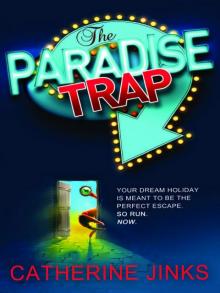 The Paradise Trap
The Paradise Trap A Very Singular Guild
A Very Singular Guild Eloise
Eloise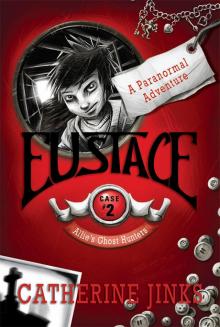 Eustace
Eustace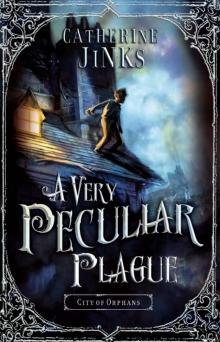 A Very Peculiar Plague
A Very Peculiar Plague Pagan's Crusade
Pagan's Crusade The Gentleman's Garden
The Gentleman's Garden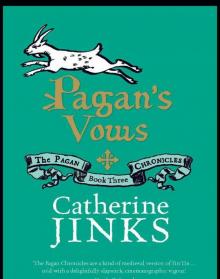 Pagan's Vows
Pagan's Vows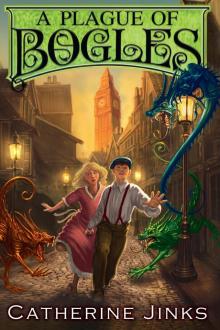 A Plague of Bogles
A Plague of Bogles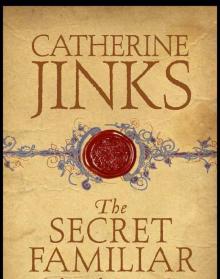 The Secret Familiar
The Secret Familiar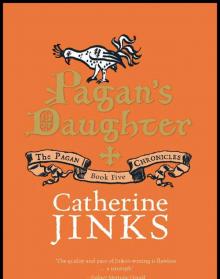 Pagan's Daughter
Pagan's Daughter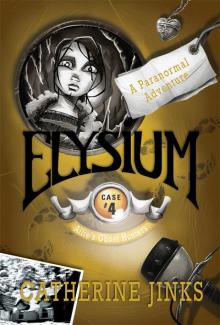 Elysium
Elysium The Reformed Vampire Support Group
The Reformed Vampire Support Group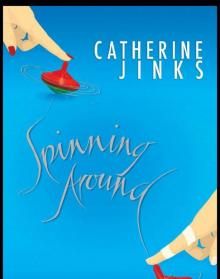 Spinning Around
Spinning Around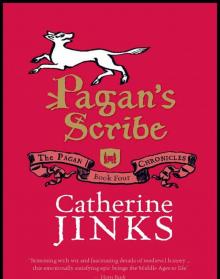 Pagan's Scribe
Pagan's Scribe Evil Genius
Evil Genius Pagan in Exile
Pagan in Exile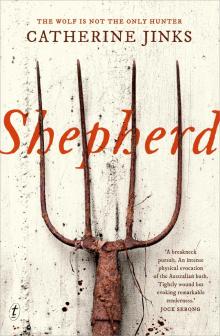 Shepherd
Shepherd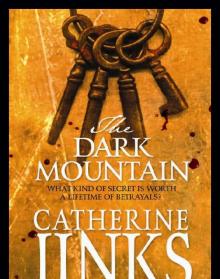 The Dark Mountain
The Dark Mountain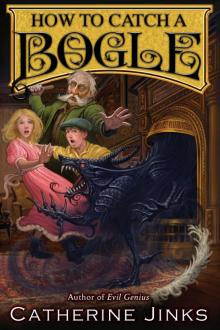 How to Catch a Bogle
How to Catch a Bogle Saving Thanehaven
Saving Thanehaven The Genius Wars
The Genius Wars The Abused Werewolf Rescue Group
The Abused Werewolf Rescue Group Theophilus Grey and the Traitor's Mask
Theophilus Grey and the Traitor's Mask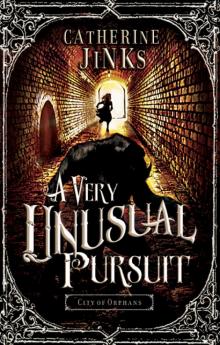 A Very Unusual Pursuit
A Very Unusual Pursuit Genius Squad
Genius Squad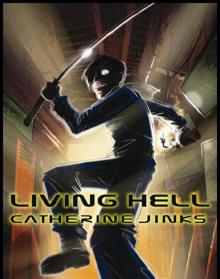 Living Hell
Living Hell The Road
The Road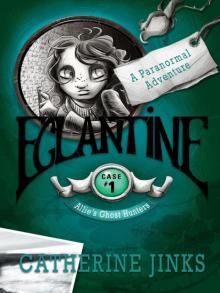 Eglantine
Eglantine